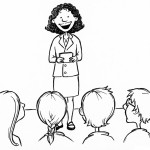 We English teachers read hundreds, if not thousands, of papers a year. And, let’s be honest, quite a few of them make us cringe. We see lack of parallel structure, run-ons, awkward phrasing, and semicolon attempts gone horribly awry. We see weak theses, unrelated details, and missing conclusions. We want to scream, “Did she even run a spell check???????”
We English teachers read hundreds, if not thousands, of papers a year. And, let’s be honest, quite a few of them make us cringe. We see lack of parallel structure, run-ons, awkward phrasing, and semicolon attempts gone horribly awry. We see weak theses, unrelated details, and missing conclusions. We want to scream, “Did she even run a spell check???????”
I know that I am not alone in my impulse to grab the red pen and circle away, pointing out every comma splice and misplaced modifier because if I can’t help them see it, then how will they learn, right?
There is a danger in following this impulse.
To illustrate, I’ll tell you about John, a senior who had just moved to our school and was repeating Junior English. My initial impressions were of a quiet, reserved young man. He didn’t say much to his tablemates, and responses to my queries were terse. However, behind this wary exterior, I suspected a clever cynic lie in wait. Each year I do a 3-2-1 exercise the first day of school. I ask students to write on notecards three things they think I need to know about them, two goals they have for the year, and one question they would like to ask me. The questions are generally predictable:
“How much homework will we have?”
“Can we eat in class?”
“Are you a nice teacher or a hard teacher?”
But then there was John’s.
“What is the air-speed velocity of an unlaiden swallow?”
However, another line on his card was one which, unfortunately, I see much more often. The number one thing he thought I should know about him was, “I hate to write.”
At Back-to-School Night, his mom gave me some insight. Apparently, in his previous school the English teacher had been incredibly critical and had broken his confidence. She assured me that he was bright and hard working but was now convinced he couldn’t write.
Soon after, first drafts of their first essays were due for workshop. I wasn’t surprised to find that John didn’t have one ready that class, nor the next. When I approached him, his hands shook and voice broke as he told me he was struggling to nail down a thesis.
“I’m not good at this,” he lamented.
Eventually, I was able to get John to verbalize his basic premise and helped him flesh out a thesis. I reminded him that like every part of the first draft, a thesis doesn’t have to be perfect or locked in stone. It was just a jumping off point. I encouraged him to get as much he could on paper for next class.
The next class he had a draft…And it was good.
I wondered what his previous teacher had been thinking. The draft wasn’t perfect, no initial attempts are, but he had an inviting introduction, precise details, and word choice that indicated a sense of tone. How could she not have recognized this? Or if she did, why in the world did she not tell him?
When I started giving feedback, before giving any editing notes, I told John about the wonderful things I saw. John didn’t say much, as per usual, but there was a hint of a smile that remained when we moved on to talk about areas that he might want to consider revising for the next workshop.
This wasn’t the last time insecurity got the best of John, but after our initial feedback session, I found him much more willing to come to me when he was stuck, and less reluctant to let anyone read what he had written. At the end of the year, he slipped a thank you note onto my desk. There was one line that stood out:
“In your class, for the first time, I felt like I wasn’t doing everything wrong.”
Now not all students are John. He had a clear talent masked by a lack of confidence. Many of my students hate to write, not just because they’ve received negative feedback, but also because the process of putting pen to paper is simply torture. For them, nothing about writing comes naturally, and in the face of a sea of red ink, these students simply shut down, thinking that you believe, just as they do, that they are helpless.
I would challenge that even these students have something to be praised, and I’m not talking empty praise. Even your lowest writer has something specific to single out as good. Maybe they have an interesting take on a subject or did a good job of sequencing details. All I know is that if I can start by telling these students what they do well, they are much more likely to work on the things they don’t.
Now, I don’t believe that finding the positive is the only element to effective feedback. Like many areas of teaching, feedback is a recipe composed with a balance of ingredients, but I would argue that genuine praise is the ingredient for which there is no substitute, and I remind myself of this every time I have the urge to grab my red pen.




